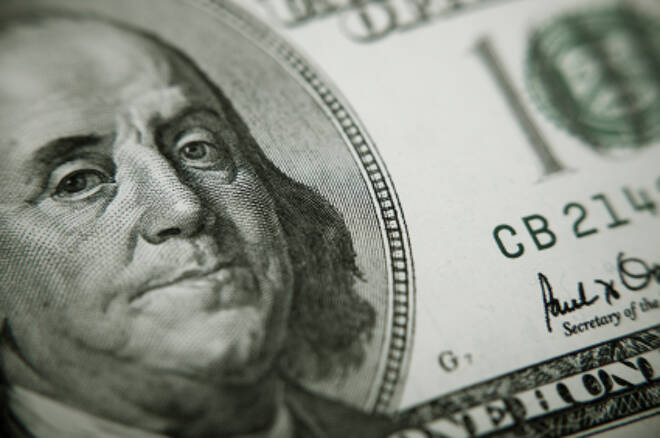Advertisement
Advertisement
Speculation Rises as US Dollar Weakens Broadly
Updated: Mar 5, 2019, 14:38 GMT+00:00
Talking points US Dollar weakens as FOMC sends a dovish signal while other central banks stay neutral Speculation that a coordinated attempt to weaken the
Talking points
- US Dollar weakens as FOMC sends a dovish signal while other central banks stay neutral
- Speculation that a coordinated attempt to weaken the US Dollar at the G20 summit gains ground
- Will a weaker US Dollar help the markets at large?
- Us – Dollar Index (ICE) falls by over 3.0% since late February/early March
Over the last two weeks, the financial markets saw a different approach from various Central banks, where the underlying theme was that for the most part, Central banks are looking at taking a step back from the currency wars. It was evident by the ECB’s press conference following the monetary policy decision on March 10th. While Mario Draghi managed to meet market expectations in delivering a broad rate cut alongside expanding QE, the comments in the press conference where Mr. Draghi ruled out further rate cuts for the time being saw the Euro reverse its losses and instead close the day with strong gains. Likewise, the RBA has been standing pat on policy for a long time with references to the Aussie’s exchange rate not being that prominent. During the ECB’s press conference, Mr. Draghi did give subtle hints that the Central Bank’s policy was likely to shift to the credit and lending mechanisms rather than try to influence exchange rates directly.
The Bank of Japan’s monetary policy decision, although widely expected saw the BoJ continue to stand on the sidelines and watch as the Yen continues to strengthen since the start of the year. The RBNZ’s surprise rate cut and exchange rate references were of course the exception to the case.
When the FOMC met last week, the markets were expecting the Fed funds rate to remain unchanged and also revised forecasts for rate hike projections. However, it was largely expected that the Fed would maintain a hawkish tone, which turned out otherwise. The Federal Reserve’s statement referenced the broader economic outlook rather than just the domestic issues, leading to the US Dollar continuing to weaken against its peers. While one way to look at the Fed’s decision would be to see the central bank trimming its forecasts to bringing it more in line with the market expectations, it doesn’t however dispel the rumors on a coordinated attempt to weaken the Dollar.
Taking all the above into context, it is starting to look evident that there is or was some kind of an agreement reached at the recently concluded G20 summit where a weaker US Dollar was perhaps agreed upon.
Central bank decisions – Summary
| Central Bank | Rates | Comments |
| ECB | 0.00% + QE expansion | Policy delivers dovish tone, but ruling out rate cuts for the near term sends the Euro higher |
| BoJ | -0.10% (No Change) | Policy left unchanged (incl. QQE). April ‘could’ see some QQE expansion |
| RBNZ | 2.25% (25bps cut) | Surprise rate cut with jawboning the Kiwi’s exchange rate |
| BoC | 0.50% (No Change) | Neutral. Prefers to wait for fiscal stimulus measures |
| BoE | 0.50% (No Change) | Hawkish. Rates likely to rise than fall |
| FOMC | 0.25% – 0.50% (No Change) | Dovish. Lowers rate hike projection to 2, from 4 |
| RBA | 2.00% (No Change) | Neutral |
Indeed, the current market turmoil has been in part due to the Dollar’s strength. Commodities remain weak, with the stronger dollar and weak demand while Oil prices struggle with the supply glut and a stronger US Dollar. A weaker Greenback could therefore help the respective markets to stabilize if not make some steady grounds, which has already been the case with GLD/XAU-USD Prices and WTI Crude-Oil. The stronger Dollar has also affected companies in the US, especially those who export a large chunk of their products cutting across profit margins.
It is still a bit too early to tell if there indeed has been some kind of deal made especially with the next few weeks of lull in the markets. The Bank of Japan, ECB, Federal Reserve, RBA and the RBNZ will be meeting in April and we will not know until then if the speculation is true. While no big changes are expected at least from the ECB and the FOMC, the RBA, RBNZ and the BoJ will be the central banks to watch for.
Between now and then, speeches from Central bankers will likely garner more attention especially from the RBA, BoJ and the RBNZ for any verbal references that could influence the exchange rates.
This article was written by Dave Goldstein, Head Analyst of Binarybrokerz.com
About the Author
Advertisement
